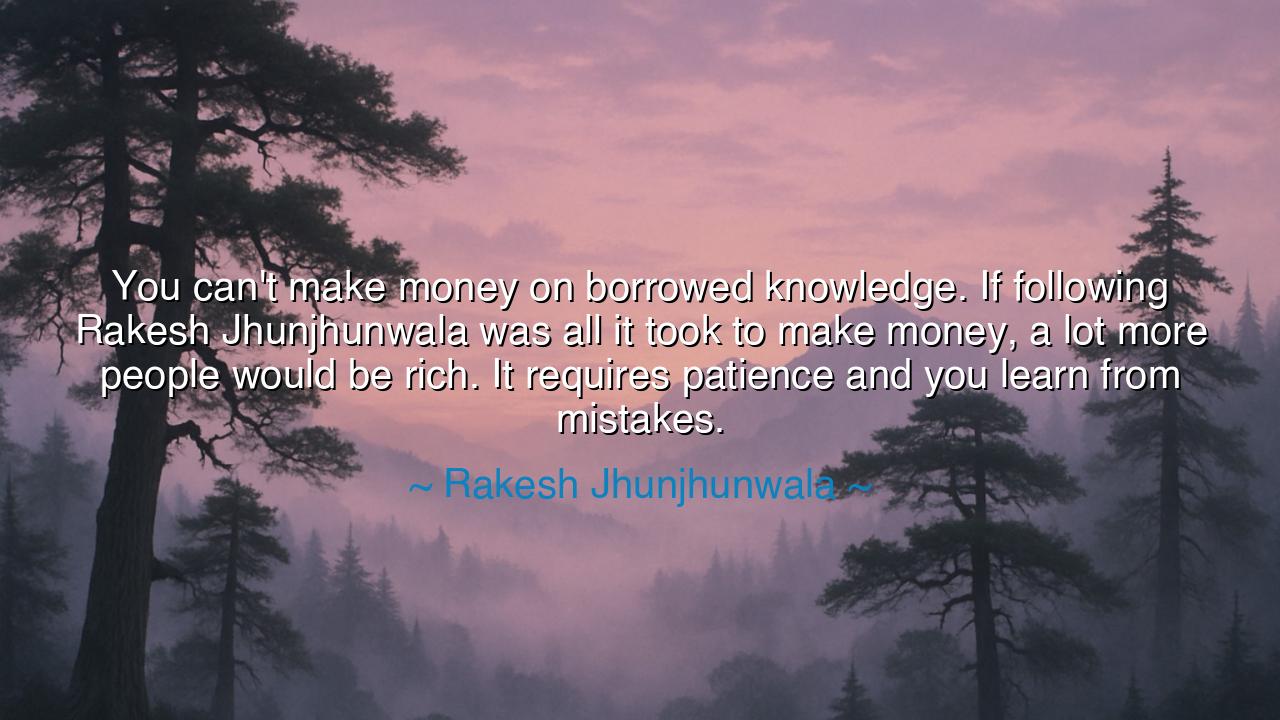
You can't make money on borrowed knowledge. If following Rakesh
You can't make money on borrowed knowledge. If following Rakesh Jhunjhunwala was all it took to make money, a lot more people would be rich. It requires patience and you learn from mistakes.






“You can’t make money on borrowed knowledge. If following Rakesh Jhunjhunwala was all it took to make money, a lot more people would be rich. It requires patience, and you learn from mistakes.” — Rakesh Jhunjhunwala
These words, spoken by Rakesh Jhunjhunwala, the legendary investor of India, cut to the very heart of human ambition. They are not merely about money, but about wisdom — about the timeless truth that true understanding cannot be inherited; it must be earned. When he says, “You can’t make money on borrowed knowledge,” he speaks not as a financier, but as a philosopher of life. For the wealth he speaks of is not just gold or shares, but the deep, quiet mastery that comes only through experience — through patience, struggle, and the humility to learn from one’s own mistakes.
In the age of quick gains and imitation, Jhunjhunwala’s words stand as a pillar of ancient wisdom dressed in modern garb. He reminds us of what the sages once taught: that secondhand wisdom is like a shadow — it looks like truth, but it has no life of its own. A man may study the moves of a master, but until he has failed and risen again, he does not truly understand the game. Wealth, like virtue, cannot be copied; it must be cultivated. The farmer does not grow crops by reading about harvests; he grows them by tilling the soil with his own hands. So too must every seeker of fortune or wisdom till the fields of their own experience.
The origin of this truth lies in Jhunjhunwala’s own journey. Born with no great inheritance, he entered the stock market with only a few thousand rupees and a restless fire in his heart. In the early days, he made mistakes — costly ones — but he did not despair. Each loss became a lesson, each failure a teacher. Over time, through observation, study, and persistence, he developed his own understanding of markets — his own rhythm, his own instincts. And when success finally came, it was not by imitation, but by self-earned insight. He had stolen no man’s wisdom; he had forged his own.
The ancients would have recognized his path. They, too, believed that the mind must be tempered as iron is — by heat and hammer. In the old Indian scriptures, it is said: “Even a teacher cannot give enlightenment; he can only show the path.” The student must walk it himself, stumbling and rising, until knowledge becomes living flame. Similarly, Jhunjhunwala’s message to the modern soul is this: you may learn from others, but do not live through them. Let their wisdom be your compass, not your crutch. For borrowed knowledge is like a map of a foreign land — useful, but only when you walk the terrain yourself.
Consider, too, the tale of Sir Isaac Newton, who lost a fortune in the South Sea Bubble of 1720. The man who understood the laws of gravity could not master the gravity of greed. He followed the wisdom of others, trusting their confidence, and when the market collapsed, he famously said, “I can calculate the movement of the stars, but not the madness of men.” Even the greatest minds fall when they act on borrowed conviction. Newton’s loss, like Jhunjhunwala’s teaching, is a timeless reminder: that knowledge is not power until it is tested through experience.
To learn from mistakes, as Jhunjhunwala counsels, is not a shame but a virtue. The ancients praised those who stumbled wisely — who turned defeat into discipline. A man who has never erred is like a sword untested by battle: polished, perhaps, but brittle. Patience and error, therefore, are the twin teachers of mastery. They refine not only the intellect but the spirit. The investor who panics at loss, the student who fears failure — both seek fruit without enduring the season. But the wise know: every failure is a seed of future strength, if only one dares to learn.
Thus, the lesson of Jhunjhunwala’s words is both simple and profound: Do not seek shortcuts to wisdom. Do not build castles on borrowed dreams. Let others’ knowledge inspire you, but let your own experience guide you. Patience is the soil of mastery, and mistakes are its rain. Embrace them both, for they are the sculptors of understanding.
And when you walk your own path — slowly, humbly, with courage — you will find that success, whether in money or in life, no longer feels like fortune. It feels like truth — something you have not copied or borrowed, but earned through your own mind, heart, and hands. That is the wealth that never fades: the wisdom of one’s own making.






AAdministratorAdministrator
Welcome, honored guests. Please leave a comment, we will respond soon